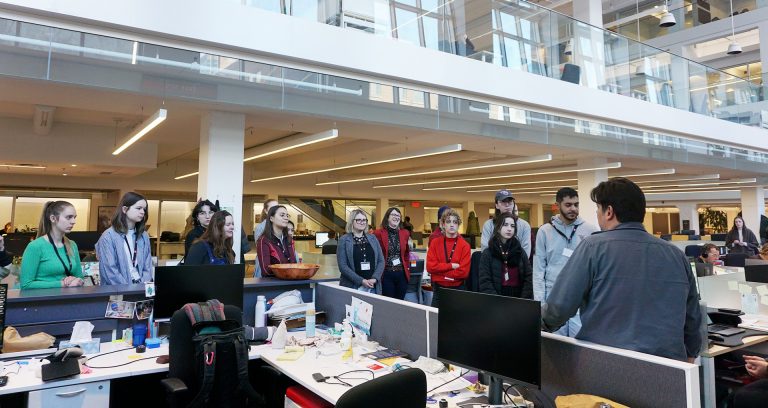A new Department of Journalism initiative promotes learning opportunities in French-language media

A new initiative in the Department of Journalism is inspiring students to pursue French-language opportunities in journalism.
Launched last winter, Club Franco aims to promote the practice of journalism en français.
Amélie Daoust-Boisvert, Lucie Laumonier and Francine Pelletier are the faculty behind this initiative. Daoust-Boisvert says it developed through the needs of students.
“They often reached out to me and other francophone colleagues to ask about opportunities in francophone media for internships and jobs,” she says. “Students wondered how to build a portfolio in French or if their French writing and speaking were up to the standards of the Quebec media.”
To respond to these needs, Daoust-Boisvert teamed up with Laumonier and Pelletier and began organizing workshops and outings to expose students to francophone learning and internship opportunities. Some of the workshops were in collaboration with l’Organe, the francophone student news outlet at Concordia.
"French is a key asset in Montreal’s journalism sector," says Clément Lechat, GrDip 23. The MA student in digital innovation in journalism studies has played a leading role in relaunching l’Organe after it lay dormant in recent years.
"I’ve heard many students express concerns about their ability to work in French — even those for whom it is a first language. We now have a student media platform that addresses this need, helping students gain the experience necessary to thrive in Montreal and Quebec's job markets. French opens doors in media organizations across the country and beyond."
In addition to the on-campus workshops, Daoust-Boisvert and her colleagues also organized a visit to the La Presse newsroom, a popular event among students. And they’ve arranged for an upcoming outing to Radio-Canada, where students will sit in on a radio show recording.
At La Presse, students had the opportunity to meet several journalists and editors and see the inner workings of the francophone outlet.
“We're in Montreal and even if you're going to work in anglophone media, you need an understanding of the francophone media landscape. Also, many of our students are francophone or bilingual. They are seeking opportunities in francophone media, but do not really know how to start,” Daoust-Boisvert adds.

‘We want our students to succeed in both ecosystems’
According to Concordia’s Office of Institutional Planning and Analysis, the primary language of a quarter of the university’s students was French as of fall 2024.
“Concordia has always been keen and rightfully proud of its attractiveness to French-speaking students,” Pelletier says. “Our goals are to help francophone and Francophile students network amongst themselves, be aware of the francophone activities on campus and, most of all, know what professional opportunities are available to them, should they prefer to work in French after graduation.”
Laumonier believes in the importance of educating all students on both francophone and anglophone media landscapes.
“We have a significant number of francophone and franco-curious students who would benefit from building a portfolio in French, finding support and resources within the department for their future career,” Laumonier says.
“The francophone and anglophone journalism cultures are pretty different, and we want our students to succeed in both ecosystems.”
Daoust-Boisvert says their next plans are to offer office hours where students can obtain information on the programs in the department, assignments and internships, in French. They also hope eventually to offer a journalism class in French.
“It’s important that francophone students feel welcome to come study here and that all students have access to a certain contact with francophone media in Quebec, in particular if their goal is to work in journalism here after they graduate,” Daoust-Boisvert concludes.
Find out more about Concordia’s Department of Journalism.


